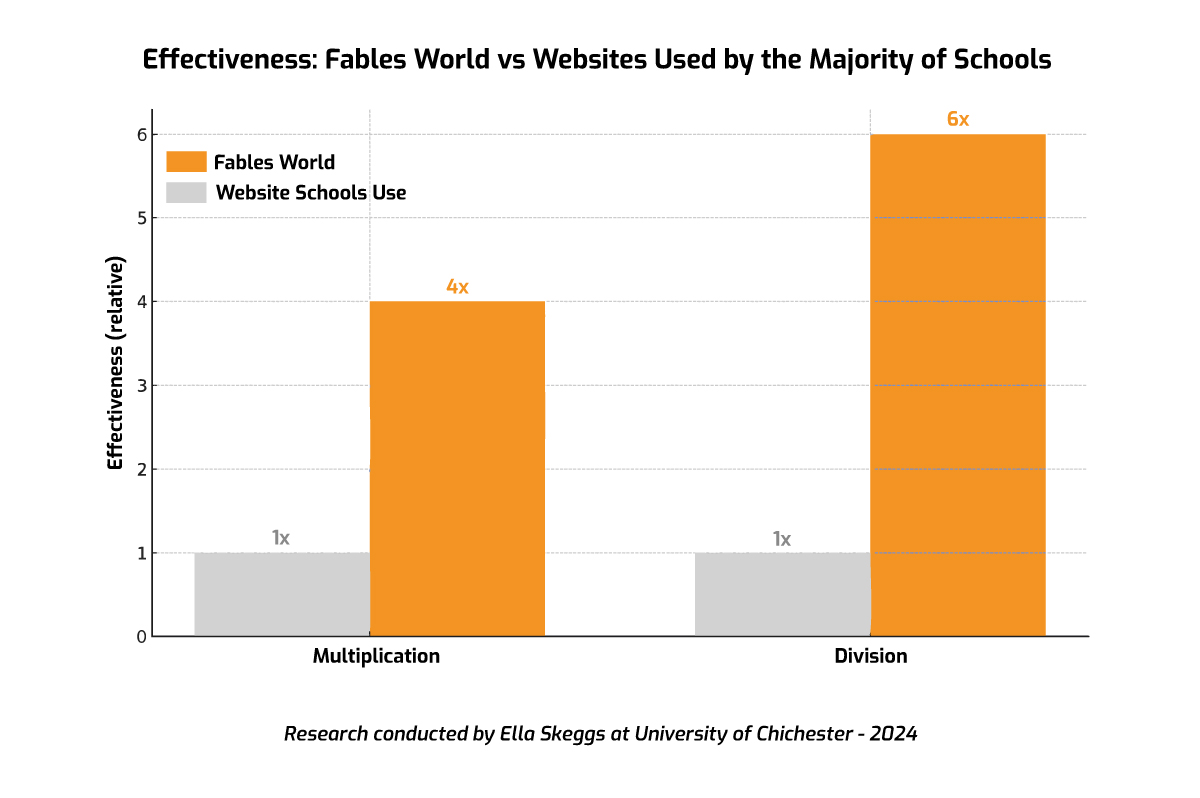Outline
The study was conducted by Ella Skeggs (SENCO) from Chichester University in 2024. The main aim of the study was to answer the question: are mnemonics effective in supporting children to retain multiplication and division facts?
What do we mean by mnemonics and why do we use them?
Mnemonics are memory aids that support recall by connecting complex ideas to simple words, images, stories or patterns. They can take the form of acronyms, rhymes, or visual prompts, and are especially effective for helping students retain and retrieve information. Research shows that mnemonics can significantly boost learning outcomes, particularly for visual and verbal learners. As a teaching tool, they offer a practical and adaptable way to enhance memory across a wide range of subjects and age groups.
Who took part
The children involved in the research project are from Year 4 and 5 in a 3-form entry primary school.
About the school
The school operates in an economically deprived area with 63% of children on the Pupil Premium register. There is also a high level of safeguarding need, with many families requiring Children Services support. This means that the children have a variety of factors acting on their attainment, attitudes and well-being. Senior leaders and teaching staff have already identified whole-school concerns around memory retention for pupils. As such, a whole-school initiative has already begun to support children through reducing cognitive load.
The school uses White Rose Maths Curriculum in Key Stage 2 (KS2) and already subscribes to the Times Tables Rock Stars (TTRS) programme. Despite this provision, some children still struggle to retain multiplication and division facts. If these children were able to quickly recall number facts, this would improve their outcomes in wider maths areas and their confidence in the subject.
Why Fables World?
Fables World was recommended by another SENCO as being successful in their school. It is an online intervention, which employs mnemonics by assigning characters and personalities to each digit. Each multiplication fact is given in the context of an animated story in which two digits interact. The programme should ideally be accessed for 5 to 10 minutes daily, with children making their way through a daily quest.
The impact of Fables World
The children who accessed Fables World as a daily intervention, made almost 32% more progress than the control group. The progress each group made is relative to the amount of time they accessed the Fables World programme; progress increases where children have accessed the programme more. This data suggests that Fables World, and therefore a mnemonic strategy, has been effective in improving the recall of multiplication and division facts among KS2 children.

Impact graph showing progress difference between Fables World group and control group
Conclusion
The study suggests that Fables World has made a positive impact both in children’s progress and engagement with the programme at this early stage of implementation. Despite concerns around mnemonics adding more to the cognitive load of children, the initial data reflects that this is not a major concern. Fables World provides children with a memory peg for the quick recall of number facts. This should therefore reduce cognitive load in situations where tables recall is one part of a multi-step problem.
By Study Ella Skeggs at University of Chichester 2024
More about the research behind mnemonics, memorisation and cognitive load
Fables World does employ other strategies, for example, daily rehearsal and reward-based activities but it is use of content unrelated to maths that is at the core of its strategy. Many mnemonic devices use representations that bear little relation to the conceptual content of the material being memorised (Bellezza, 1981). If new information is related to something that is locked in long-term memory, such as images of everyday objects, mnemonic theory dictates that retrieval will be easier. However, this notion sits in opposition to theories around reducing cognitive load. Indeed, Dehn (2008) notes that some professionals have expressed the concern that mnemonic strategies add to the overall amount of information to be memorised, thus overloading working memory and producing confusion in the minds of learners. Despite this, Dehn asserts that there is much evidence of the success of mnemonic strategies that leave these concerns redundant. He cites the success of mnemonics in the recall of serial words.